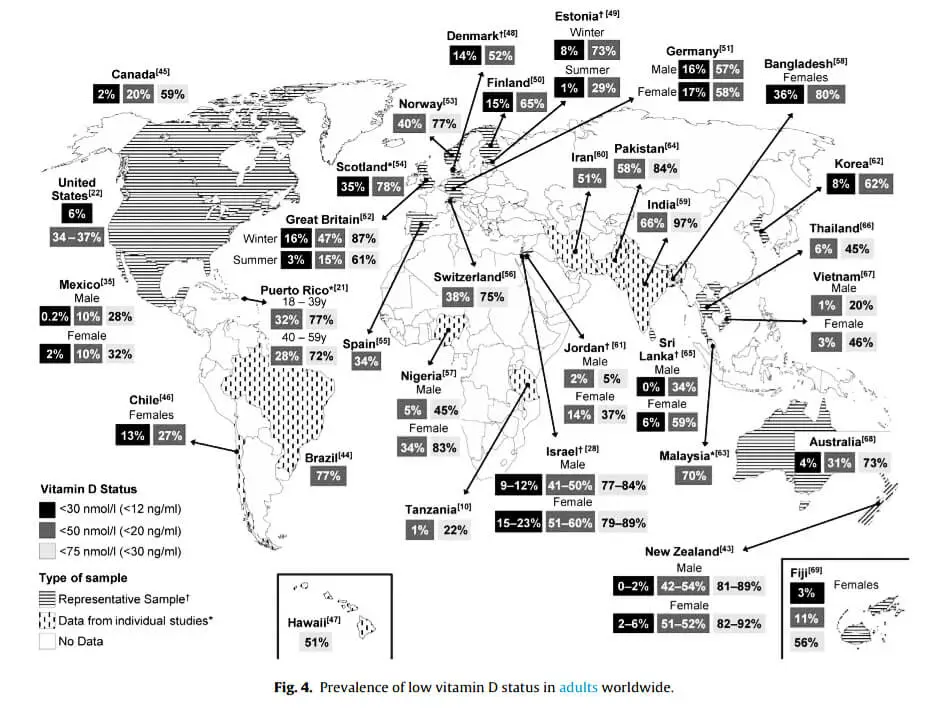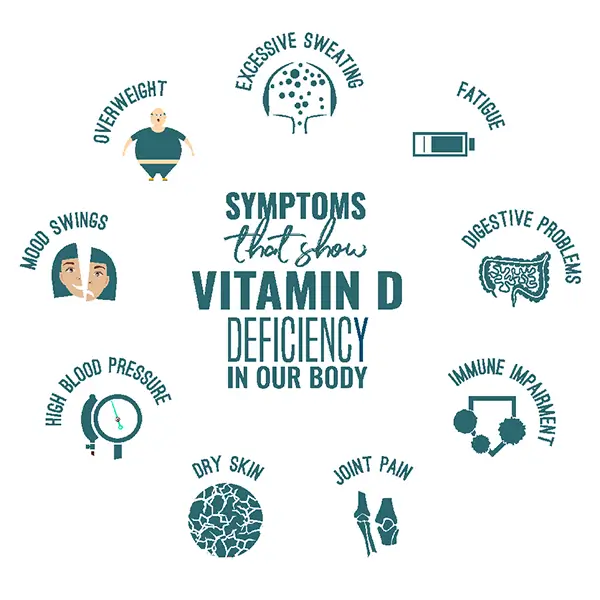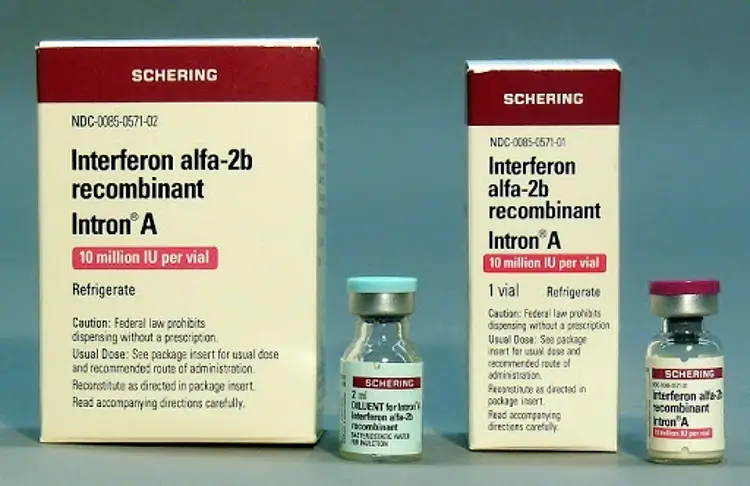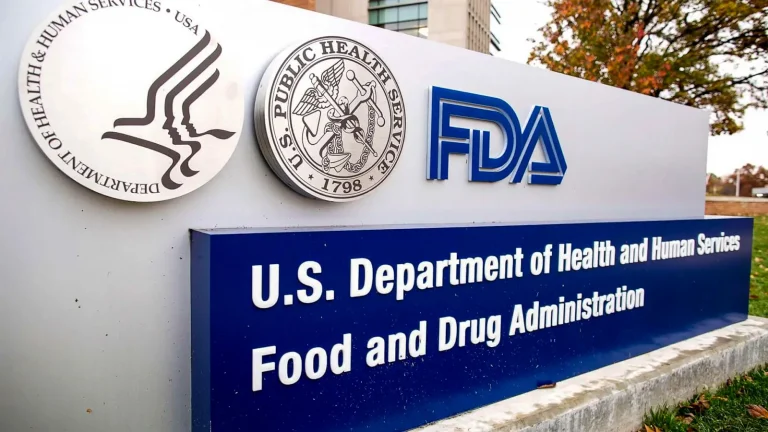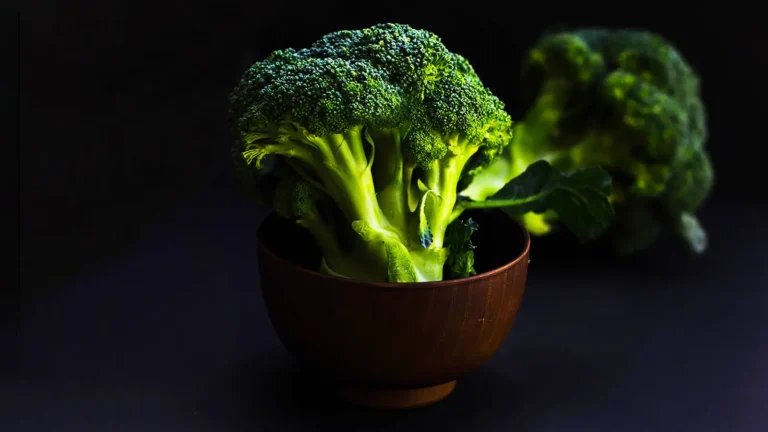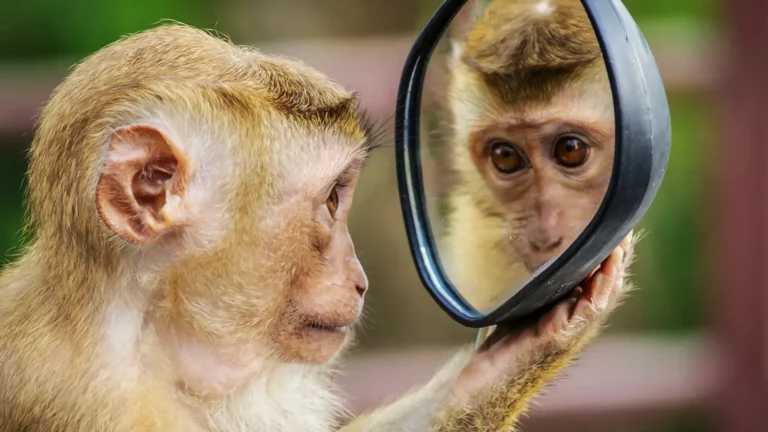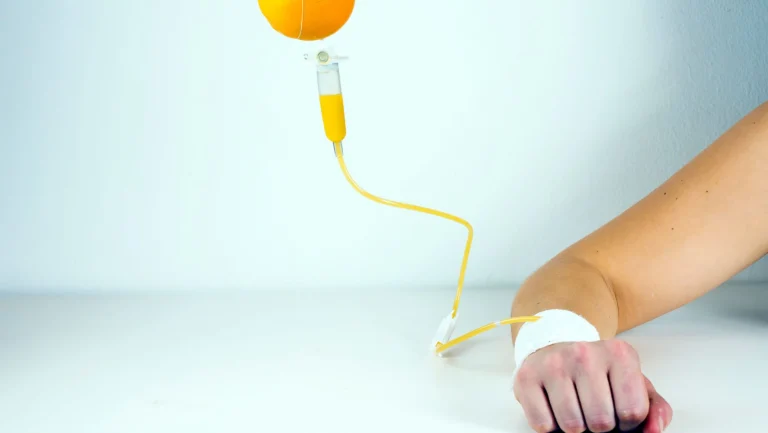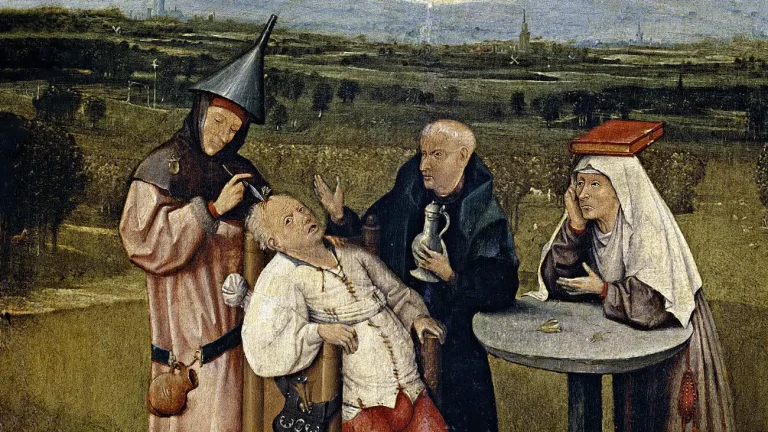A deficiência de vitamina D - Fatores de Risco
Existem apenas duas vitaminas que não são produzidos pelas plantas, vitamina D, e o outro de vitamina B12. A deficiência de vitamina D é uma preocupação real.
Milos Pokimica
Escrito por: Milos Pokimica
Revisto Clinicamente Por: Dr. Xiùying Wáng, M.D.
Actualizado em 9 de Junho de 2023Existem apenas duas vitaminas que não são produzidas pelas plantas. Uma é a vitamina D que nós próprios produzimos durante a exposição à luz solar e a outra seria a vitamina B12. Se for vegan, são apenas estas duas vitaminas que terá de suplementar.
A deficiência de vitamina D é uma das mais deficiências vitamínicas comuns no mundo. Nos EUA, cerca de 40% da população encontra-se na categoria de deficiência grave de vitamina D e mais de 85% na categoria de nível insuficiente (Pojsupap et al., 2015). Muito provavelmente, se não tiver uma deficiência grave, continuará a não ter níveis adequados e óptimos de vitamina D para o funcionamento normal do organismo. O que causa a deficiência de vitamina D é o modo de vida moderno, é uma forma de má adaptação ao nosso ambiente atual.
Mesmo que se viva num clima ensolarado, é muito provável que o tenha. Apesar da substancial disponibilidade diária de luz solar em África e no Médio Oriente, as pessoas que vivem nestas regiões são frequentemente deficitárias ou insuficientes em vitamina D, variando entre 5% e 80%. A insuficiência de vitamina D é especialmente galopante entre os afro-americanos. Mesmo os negros jovens e saudáveis não atingem concentrações óptimas em qualquer altura do ano. Quanto mais escura for a pele, menos radiação UV irá absorver.
Afastámo-nos do clima ensolarado de África, onde evoluímos há 60 milhões de anos, e agora estamos no clima frio do hemisfério norte, sem luz solar, e vivemos dentro de casa e usamos tecidos para nos protegermos do frio. Como resultado, não temos níveis adequados de vitamina D durante a maior parte do ano e precisamos de a suplementar. Dependendo do seu peso e da exposição solar, deve tomar entre 4000 e 5000 UI. Pode tomar demasiada vitamina D, o nível máximo tolerável é de 10 000 UI por dia, mas tomar mais de 5000 terá poucos benefícios para a saúde em geral e pode baixar os níveis de vitamina A.
Para analisar esta questão um pouco mais a primeira coisa que temos de compreender é que a vitamina D não é realmente uma vitamina. É um prohormone, um esteróide com uma actividade hormonal que regula cerca de 3% do genoma humano. Mais de 2.000 genes no total.
O metabolismo do cálcio é apenas uma das suas muitas funções. Por exemplo, é muito importante para a regulação do nosso sistema imunitário. A regulação do sistema imunitário é muito importante porque o sistema imunitário pode atacar as células que não deve atacar e, ao mesmo tempo, pode ignorar outros organismos perigosos que não deve ignorar. Sem níveis adequados de vitamina D, o nosso sistema imunitário pode tornar-se "hiperactivo" e começará a atacar as nossas próprias células. Esta é uma razão pela qual a deficiência de vitamina D está ligada ao desenvolvimento de dezassete doenças auto-imunes diferentes. O funcionamento do sistema imunitário é também um grande factor no desenvolvimento do cancro e das doenças periodontais, pelo que a deficiência de vitamina D também está correlacionada com estas doenças. Não está, contudo, correlacionada com doenças cardiovasculares e acidentes vasculares cerebrais.
Assim, a deficiência de vitamina D está correlacionada com um aumento da taxa de mortalidade e, além disso, está correlacionada com doenças que afectam a qualidade de vida como a osteoporose e a asma. Porque na realidade é uma hormona e não uma vitamina, é essencial para um grande número de funções no organismo. A realidade é que mesmo que não tenhamos uma deficiência em grande escala, podemos ainda assim estar a um nível inferior ao óptimo e, como resultado, aumentar a nossa risco de cancro, têm um problema com o sistema imunitário, e para além disso têm osteoporose. A deficiência de vitamina D também pode afectar o humor em algumas pessoas que são propensas à depressão. A questão aqui é se precisamos de a tomar se somos deficientes e se não a tomarmos, será que vamos aumentar o nosso risco a um nível real e mensurável?
No presente estudo, por exemplo (Mirzakhani et al., 2015) dar às crianças asmáticas entre 500 a 2.000 unidades internacionais de vitamina D3 por dia reduz as exacerbações da asma em mais de metade. Como a asma é uma sobre-estimulação imunitária, a vitamina D "acalma" o sistema imunitário de certa forma. A asma afecta cerca de 10% das crianças. Uma das razões pelas quais a asma e as alergias estão a aumentar é o aumento da taxa de deficiência de vitamina D (Raftery et al., 2015). Cerca de 50% dos casos de asma são causados por factores genéticos e não por factores ambientais e o mesmo se passa com as alergias. Nos estudos clínicos, a maioria das pessoas que sofrem de alergias e de asma beneficiaram, independentemente de a sua doença ser ou não causada por factores genéticos. Em termos científicos:
" A vitamina D demonstrou a capacidade de inibir tanto as respostas do tipo Th1 como do tipo Th2, suprimindo a produção de IFN-γ gerado por IL-12, bem como a expressão de IL-4 e IL-4 induzida por IL-13. Esta capacidade pode ser importante, uma vez que o equilíbrio de Th1 e Th2 afecta o padrão da resposta imunitária. Enquanto se pensa que a asma é uma doença dominante Th2 e é largamente caracterizada pela produção de citocinas como IL-4, IL-5, IL10 e IL-13, e pela produção de IgE por células B..."
(Raftery et al., 2015)
Ou, em palavras normais, a supressão da produção de citocinas e IgE do sistema imunitário irá parar a sobre-estimulação do nosso sistema imunitário e irá embotar a sua resposta "hiperactiva". A vitamina D basicamente diz ao nosso sistema imunitário para "arrefecer" e, ao mesmo tempo, não afecta o funcionamento normal do sistema imunitário. É apenas uma modulação em casos de sobre-estimulação.
A vitamina D não é uma cura, mas é uma terapia suplementar essencial e benéfica sem efeitos secundários, excepto no que diz respeito aos efeitos positivos globais sobre o corpo. Em condições ambientais normais, esta terapia suplementar não seria necessária.
Se olharmos para a maioria das outras doenças do sistema imunitário e para o papel da vitamina D, a história seria a mesma. Por exemplo, a deficiência de vitamina D é comum entre os doentes com Doença Inflamatória Intestinal (Fletcher et al., 2019).
"As provas emergentes sugerem que a vitamina D pode ter papéis na imunidade inata e adaptativa, na imunopatogénese da doença de CrohnNa prevenção de hospitalizações e cirurgias relacionadas com a doença de Crohn, na redução da gravidade da doença e na prevenção do cancro do cólon".
(Fletcher et al., 2019)
Doença de Crohn e colite ulcerosa são doenças inflamatórias crónicas do intestino em que o sistema imunitário ataca as suas próprias células causando uma inflamação grave. Ao contrário das alergias, neste caso o sistema imunitário ataca as suas próprias células por engano, acreditando que estas são infecciosas e, ao contrário das alergias, não se trata "apenas" de uma inflamação ou de uma hiper-resposta, mas de danos reais e permanentes no nosso próprio ADN. A razão pela qual isto acontece é uma ciência complicada e, na maioria dos casos, não é genética, mas sim um tipo de mau funcionamento do sistema imunitário. Há casos de gémeos idênticos em que um tem doença de Chron e o outro não. Existe uma correlação entre os níveis de vitamina D e a doença de Chron (Jørgensen et al., 2010). Os países com mais luz solar têm menos doença de Chron, as regiões do norte dos EUA têm mais casos do que os estados do sul, e também clinicamente, quando medimos o nível de vitamina D em pessoas com a doença, a correlação seria a mesma. Mas e se já tivermos a doença? Neste estudo, por exemplo, a suplementação oral com 1200 IE de vitamina D3 aumentou significativamente os níveis séricos de vitamina D e reduziu significativamente o risco de recaída de 29% para 13% (Aranow, 2011). Concluíram que:
"A vitamina D tem funções imuno-reguladoras na colite experimental e níveis baixos de vitamina D estão presentes na doença de Crohn".
(Aranow, 2011)
Para obter os benefícios da Doença Inflamatória do Colón necessitará de pelo menos 5.000 UI de vitamina D por dia e isto é muito mais do que RDA porque este será o nível que será necessário para chegar aos níveis normais na corrente sanguínea num sentido evolutivo.
E o funcionamento normal do sistema imunitário? A deficiência de vitamina D irá causar supressão imunitária e aumentar o risco de gripe?
"É agora claro que a vitamina D tem papéis importantes, para além dos seus efeitos clássicos sobre homeostase de cálcio e osso. Como o receptor de vitamina D é expresso nas células imunitárias (células B, células T e células que apresentam antigénio) e estas células imunológicas são todas capazes de sintetizar o metabolito activo de vitamina D... A vitamina D pode modular as respostas imunitárias inatas e adaptativas. A carência em vitamina D está associada a um aumento da auto-imunidade, bem como a uma maior susceptibilidade à infecção."
(Gal-Tanamy et al., 2011)
Hoje em dia é bem aceite na comunidade científica e há uma quantidade substancial de investigação sobre o assunto de que a deficiência crónica de vitamina D irá criar condições mais susceptíveis à vasta gama de diferentes tipos de infecções, para além do facto de a vitamina D ajudar na desregulamentação das respostas imunitárias excessivamente estimuladas.
A carência em vitamina D está portanto associada tanto ao aumento da auto-imunidade como ao aumento da susceptibilidade à infecção. É uma vitamina importante para o funcionamento imunitário global e prevenção de doenças, especialmente em idosos e crianças que já são mais susceptíveis à infecção. Em tempos de Coronavírus, este conhecimento pode ser de alguma utilidade. No presente estudo, por exemplo (Garland et al., 2006), a suplementação com vitamina D melhorou a resposta biológica quando combinada com um tratamento antiviral contra o vírus da hepatite C.
D3 e interferon-α inibiram sinergicamente a produção viral. O interferão é um modulador natural do sistema imunitário que o nosso organismo produz quando lida com infecções e é um tratamento padrão na maioria dos tratamentos virais, incluindo os vírus da gripe como a COVID-19. Conclusão:
"Este estudo demonstra pela primeira vez um efeito antiviral directo da vitamina D num sistema de produção de vírus infecciosos in vitro. Propõe uma interacção entre o sistema endócrino hepático de vitamina D e o HCV, sugerindo que a vitamina D tem um papel de mediador antiviral natural. É importante notar que o nosso estudo implica que a vitamina D pode ter um efeito de repartição do interferão, melhorando assim o tratamento antiviral dos doentes infectados pelo HCV".
(Garland et al., 2006)
Ao contrário do interferão, a vitamina D3 não tem efeitos secundários e é muito barata. À maioria das pessoas com doenças imunitárias é prescrito algum tipo de interferão, por exemplo, aos doentes com esclerose múltipla é geralmente administrado interferão beta para reduzir a inflamação. As injecções de interferão são muito caras, pelo que não serão administradas à escala da população para reduzir a mortalidade por COVID-19, mas existe uma alternativa natural e barata no chá verde (Juszkiewicz et al., 2019), (Li et al., 2016), (Turner et al., 2014). Imunologistas da Universidade de Harvard descobriram que beber chá verde estimula drasticamente, em alguns casos mais de 10 vezes, o aumento da produção natural de interferão do nosso corpo. Isto deve-se ao facto de o aminoácido que só se encontra no chá verde se chamar L-Teanina. A L-Teanina é decomposta no fígado para criar etilamina, uma molécula que inicia a resposta das células T gama-delta. As células T no sangue provocam a libertação de interferão. No caso do surto de coronavírus, este conhecimento poderá ser-lhe útil como estratégia de prevenção (Turner et al., 2014). São necessários cerca de 30 gramas de chá verde seco por dia para estimular o interferão de forma endógena. Este assunto será abordado num outro artigo. O interferão é um "medicamento milagroso" secreto de Cuba que está a ser utilizado contra o coronavírus. É apenas um interferão. O interferão Alfa-2B é produzido na China, pela empresa comum cubano-chinesa ChangHeber.
Considerando a vitamina D, a mesma que em qualquer outra doença do sistema imunitário, ela regula quase todas as doenças auto-imunes. Estudos demonstraram, por exemplo, que as pessoas que têm níveis mais elevados de vitamina D3 têm um risco mais baixo de EM. Portanto, a suplementação com vitamina D é considerada um importante factor de risco ambiental modificável para o desenvolvimento de esclerose múltipla. Além disso, estudos sugerem que para as pessoas que já têm EM, a vitamina D pode oferecer alguns benefícios.
Existe também uma ligação entre o cancro e a vitamina D. Uma vez que as células cancerígenas são destruídas pelo sistema imunitário todos os dias, o mau funcionamento do sistema imunitário devido a uma deficiência crónica de D3 pode resultar na acumulação de células cancerígenas e, eventualmente, no desenvolvimento de cancro. Uma deficiência de vitamina D pode não ser a única razão pela qual alguém contrai cancro, mas aumenta o risco de desenvolvimento de cancro em indivíduos que já têm esse risco (Wang et al., 2014). Pode também afectar a taxa de sobrevivência ao cancro. Num estudo, a vitamina D aumentou a taxa de sobrevivência do cancro colorrectal em 47% (Reid et al., 2011). Não sei se este será um tratamento eficaz para todos os tipos de cancro. Provavelmente não, mas é uma terapia barata, promotora da saúde e sem efeitos secundários. Na verdade, não se trata de uma terapia, mas de uma forma de intervenção nutricional, no sentido em que tem um efeito sobre o sistema imunitário. Até os dados estatísticos mostram que existe uma diferença significativa entre a taxa de mortalidade por cancro do cólon em diferentes estações do ano, dependendo da exposição à luz solar. A vitamina D está fortemente correlacionada com alguns tipos de cancro, como o do cólon, da mama, dos ovários e o linfoma. No total, 14 tipos diferentes de cancro estão associados a níveis mais baixos de vitamina D.
Além disso, qualquer tipo de lesão, como uma cirurgia, por exemplo, faz baixar drasticamente os níveis de vitamina D, por vezes mesmo em poucas horas (Reid et al., 2011). A razão pela qual isto acontece deve-se provavelmente à influência que a vitamina D tem na inflamação. Ou, se invertermos a lógica, se a inflamação e as lesões diminuem os níveis de vitamina D, então os baixos níveis de vitamina D podem causar um aumento da inflamação no corpo. A inflamação, por si só, pode causar a supressão do sistema imunitário e o aumento do risco de cancro e está associada a uma vasta gama de doenças crónicas. Se se provar que a ligação entre a deficiência de vitamina D e a inflamação está correcta, então será um factor sério e independente que terá de ser tido em conta quando se pensar nos factores de risco associados à deficiência.
A vitamina D é relativamente barata, a única questão que realmente se coloca é saber quanto devemos tomar, sob que forma, e se precisamos de a tomar durante um ano inteiro se tivermos uma exposição solar adequada durante o Verão?
Referências:
- Pojsupap, S., Iliriani, K., Sampaio, T. Z., O'Hearn, K., Kovesi, T., Menon, K., & McNally, J. D. (2015). Eficácia da vitamina D em altas doses na asma pediátrica: uma revisão sistemática e meta-análise. The Journal of asthma : jornal oficial da Associação para o Tratamento da Asma, 52(4), 382-390. https://doi.org/10.3109/02770903.2014.980509
- Mirzakhani, H., Al-Garawi, A., Weiss, S. T., & Litonjua, A. A. (2015). A vitamina D e o desenvolvimento de doenças alérgicas: qual a sua importância? Alergia clínica e experimental: revista da Sociedade Britânica de Alergia e Imunologia Clínica, 45(1), 114-125. https://doi.org/10.1111/cea.12430
- Raftery, T., & O'Sullivan, M. (2015). Níveis ideais de vitamina D na doença de Crohn: uma revisão. Actas da Sociedade de Nutrição, 74(1), 56-66. https://doi.org/10.1017/S0029665114001591
- Fletcher, J., Cooper, S. C., Ghosh, S., & Hewison, M. (2019). O papel da vitamina D na doença inflamatória intestinal: Mecanismo para gerenciamento. Nutrientes, 11(5), 1019. https://doi.org/10.3390/nu11051019
- Jørgensen, S. P., Agnholt, J., Glerup, H., Lyhne, S., Villadsen, G. E., Hvas, C. L., Bartels, L. E., Kelsen, J., Christensen, L. A., & Dahlerup, J. F. (2010). Ensaio clínico: tratamento com vitamina D3 na doença de Crohn - um estudo aleatório, duplo-cego e controlado por placebo. Farmacologia e terapêutica alimentar, 32(3), 377-383. https://doi.org/10.1111/j.1365-2036.2010.04355.x
- Aranow C. (2011). A vitamina D e o sistema imunitário. Journal of investigative medicine: a publicação oficial da Federação Americana de Investigação Clínica, 59(6), 881-886. https://doi.org/10.2310/JIM.0b013e31821b8755
- Gal-Tanamy, M., Bachmetov, L., Ravid, A., Koren, R., Erman, A., Tur-Kaspa, R., & Zemel, R. (2011). Vitamina D: um agente antiviral inato que suprime o vírus da hepatite C em hepatócitos humanos. Hepatologia (Baltimore, Md.), 54(5), 1570-1579. https://doi.org/10.1002/hep.24575
- Garland, C. F., Garland, F. C., Gorham, E. D., Lipkin, M., Newmark, H., Mohr, S. B., & Holick, M. F. (2006). O papel da vitamina D na prevenção do cancro. Jornal americano de saúde pública, 96(2), 252-261. https://doi.org/10.2105/AJPH.2004.045260
- Wang, B., Jing, Z., Li, C., Xu, S., & Wang, Y. (2014). Níveis sanguíneos de 25-hidroxivitamina D e mortalidade geral em pacientes com câncer colorretal: uma meta-análise de dose-resposta. European journal of cancer (Oxford, Inglaterra: 1990), 50(12), 2173-2175. https://doi.org/10.1016/j.ejca.2014.05.004
- Reid, D., Toole, B. J., Knox, S., Talwar, D., Harten, J., O'Reilly, D. S., Blackwell, S., Kinsella, J., McMillan, D. C., & Wallace, A. M. (2011). A relação entre alterações agudas na resposta inflamatória sistémica e as concentrações plasmáticas de 25-hidroxivitamina D após artroplastia electiva do joelho. O American journal of clinical nutrition, 93(5), 1006-1011. https://doi.org/10.3945/ajcn.110.008490
- Rahayu, R. P., Prasetyo, R. A., Purwanto, D. A., Kresnoadi, U., Iskandar, R. P. D., & Rubianto, M. (2018). O efeito imunomodulador do chá verde (Camellia sinensis) em ratos Wistar imunocomprometidos infectados por Candida albicans. Mundo veterinário, 11(6), 765-770. https://doi.org/10.14202/vetworld.2018.765-770
- Juszkiewicz, A., Glapa, A., Basta, P., Petriczko, E., Żołnowski, K., Machaliński, B., Trzeciak, J., Łuczkowska, K., & Skarpańska-Stejnborn, A. (2019). O efeito da suplementação de L-teanina no sistema imunológico de atletas expostos a exercícios físicos extenuantes. Jornal da Sociedade Internacional de Nutrição Desportiva, 16(1), 7. https://doi.org/10.1186/s12970-019-0274-y
- Li, C., Tong, H., Yan, Q., Tang, S., Han, X., Xiao, W., & Tan, Z. (2016). L-Theanine melhora a imunidade alterando o equilíbrio de citocinas TH2 / TH1, neurotransmissores cerebrais e expressão de fosfolipase C em corações de ratos. Medical science monitor : revista médica internacional de investigação experimental e clínica, 22, 662-669. https://doi.org/10.12659/msm.897077
- Turner, R. B., Felton, A., Kosak, K., Kelsey, D. K., & Meschievitz, C. K. (1986). Prevenção de resfriados experimentais de coronavírus com interferon alfa-2b intranasal. Jornal de doenças infecciosas, 154(3), 443-447. https://doi.org/10.1093/infdis/154.3.443
- Palacios, C., & Gonzalez, L. (2014). A deficiência de vitamina D é um grande problema de saúde pública global? Jornal de bioquímica de esteróides e biologia molecular, 144 Pt A, 138-145. https://doi.org/10.1016/j.jsbmb.2013.11.003
Publicações Relacionadas
Você tem alguma dúvida sobre saúde e nutrição?
Eu adoraria ouvir de você e respondê-las em meu próximo post. Agradeço sua contribuição e opinião e espero ouvir de você em breve. Eu também convido você a siga-nos no Facebook, Instagram e Pinterest para mais conteúdos sobre dieta, nutrição e saúde. Pode deixar um comentário e ligar-se a outros entusiastas da saúde, partilhar as suas dicas e experiências e obter apoio e encorajamento da nossa equipa e comunidade.
Espero que este post tenha sido informativo e agradável para si e que esteja preparado para aplicar os conhecimentos que aprendeu. Se achou este post útil, por favor partilhá-lo com os seus amigos e familiares que também possam beneficiar com isso. Nunca se sabe quem poderá precisar de alguma orientação e apoio no seu percurso de saúde.
– Você Também Pode Gostar –

Aprender Sobre Nutrição
Milos Pokimica é médico de medicina natural, nutricionista clínico, escritor de saúde e nutrição médica, e conselheiro em ciências nutricionais. Autor da série de livros Go Vegan? Revisão de Ciênciaopera também o website de saúde natural GoVeganWay.com
Medical Disclaimer
GoVeganWay.com traz análises das pesquisas mais recentes sobre nutrição e saúde. As informações fornecidas representam a opinião pessoal do autor e não pretendem nem implicam substituir aconselhamento, diagnóstico ou tratamento médico profissional. As informações fornecidas são apenas para fins informativos e não se destinam a servir como substituto para consulta, diagnóstico e/ou tratamento médico de um médico ou profissional de saúde qualificado.NUNCA DESCONSIDERE o CONSELHO MÉDICO PROFISSIONAL OU adiar a BUSCA de TRATAMENTO MÉDICO por causa DE ALGO QUE TENHA LIDO OU ACESSADO por MEIO de GoVeganWay.com
NUNCA APLIQUE QUAISQUER MUDANÇAS de estilo de VIDA OU QUALQUER MUDANÇA COMO UMA CONSEQUÊNCIA DE ALGO QUE TENHA LIDO NO GoVeganWay.com ANTES de CONSULTORIA de LICENÇA MÉDICA.
No caso de uma emergência médica, ligue para o médico ou para o 911 imediatamente. GoVeganWay.com não recomenda ou endossa qualquer específicos, grupos, organizações, exames, médicos, produtos, procedimentos, opiniões ou outras informações que podem ser mencionadas dentro.
Sugestões do Editor –
Milos Pokimica é médico de medicina natural, nutricionista clínico, escritor de saúde e nutrição médica, e conselheiro em ciências nutricionais. Autor da série de livros Go Vegan? Revisão de Ciênciaopera também o website de saúde natural GoVeganWay.com
Artigos Mais Recentes -
Planta De Notícias Com Base Em
-
Texas Has Become The Seventh US State To Ban Cultivated Meat Sales
on Junho 30, 2025
-
Vegan Feta And Corn Salad
on Junho 30, 2025
-
Sunflower Meal Is A ‘Promising’ New Protein Base For Meat Alternatives, Says Study
on Junho 30, 2025
-
This Is What They Eat In Okinawa To Live Longer
on Junho 30, 2025
-
Where Do Vegans Get Their Protein? The Ultimate 2025 Response
on Junho 29, 2025
-
Saffron Green Bean Rice
on Junho 29, 2025
-
Tomato Choka Salad With Chickpea Tofu
on Junho 29, 2025
Superior De Saúde De Notícias — ScienceDaily
- Scientists just found a sugar switch that protects your brain from Alzheimer’son Junho 30, 2025
Scientists have uncovered a surprising sugar-related mechanism inside brain cells that could transform how we fight Alzheimer’s and other dementias. It turns out neurons don’t just store sugar for fuel—they reroute it to power antioxidant defenses, but only if an enzyme called GlyP is active. When this sugar-clearing system is blocked, toxic tau protein builds up and accelerates brain degeneration.
- This AI tracks lung tumors as you breathe — and it might save liveson Junho 30, 2025
An AI system called iSeg is reshaping radiation oncology by automatically outlining lung tumors in 3D as they shift with each breath. Trained on scans from nine hospitals, the tool matched expert clinicians, flagged cancer zones some missed, and could speed up treatment planning while reducing deadly oversights.
- Ancient DNA reveals leprosy hit the Americas long before colonizationon Junho 30, 2025
Leprosy’s tale stretches from 5,000-year-old skeletons in Eurasia to a startling 4,000-year-old case in Chile, revealing that the rare strain Mycobacterium lepromatosis haunted the Americas millennia before Europeans arrived. Armed with cutting-edge ancient-DNA sleuthing, scientists have pieced together remarkably well-preserved genomes that challenge the idea of leprosy as purely a colonial import and hint that the disease may have homegrown American roots awaiting confirmation by future […]
- Scientists discover ‘off switch’ enzyme that could stop heart disease and diabeteson Junho 30, 2025
Researchers at UT Arlington have discovered a key enzyme, IDO1, that when blocked, helps immune cells regain their ability to properly process cholesterol—something that breaks down during inflammation. This breakthrough could offer a powerful new way to fight heart disease, diabetes, cancer, and more. By “turning off” this enzyme, the team restored cholesterol absorption in macrophages, potentially stopping disease at the source. Even more promising, they found a second enzyme, NOS, that […]
- Fire smoke exposure leaves toxic metals and lasting immune changeson Junho 30, 2025
Smoke from wildfires and structural fires doesn t just irritate lungs it actually changes your immune system. Harvard scientists found that even healthy people exposed to smoke showed signs of immune system activation, genetic changes tied to allergies, and even toxic metals inside their immune cells.
- The gene that hijacks fear: How PTEN rewires the brain’s anxiety circuiton Junho 29, 2025
Deleting a gene called PTEN in certain brain cells disrupts the brain’s fear circuitry and triggers anxiety-like behavior in mice — key traits seen in autism. Researchers mapped how this genetic tweak throws off the brain’s delicate balance of excitation and inhibition in the amygdala, offering deep insights into how one gene can drive specific ASD symptoms.
- Brain scan breakthrough reveals why Parkinson’s drugs don’t always workon Junho 29, 2025
Researchers are using an advanced brain imaging method called MEG to understand why Parkinson’s drug levodopa doesn’t work equally well for everyone. By mapping patients’ brain signals before and after taking the drug, they discovered that it sometimes activates the wrong brain regions, dampening its helpful effects. This breakthrough could pave the way for personalized treatment strategies, ensuring patients receive medications that target the right areas of their brain more effectively.
PubMed, #vegan-dieta –
- Micronutrient intake and nutritional status in 16-to-24-year-olds adhering to vegan, lacto-ovo-vegetarian, pescatarian or omnivorous diets in Swedenon Junho 26, 2025
CONCLUSION: Youth, regardless of dietary practice, need support to ensure adequate micronutrient intakes, particularly for vitamin D and selenium. Further research is required to evaluate iodine nutrition in Swedish youth.
- Dietary Patterns and Sustainable Lifestyles: A Multicenter Study from Latin America and Spainon Junho 26, 2025
Food systems interact through multiple dimensions including food security, nutrition, and planetary health. This study aims to associate different dietary patterns with sustainable lifestyles in Latin America and Spain. This was an observational, analytical, multicenter, cross-sectional survey study, with a total of 6412 participants. A self-administered questionnaire was developed in an online format in the Google Docs interface. The questionnaire was divided into sections: (1) […]
- Integrating comparative genomics and risk classification by assessing virulence, antimicrobial resistance, and plasmid spread in microbial communities with gSpreadCompon Junho 26, 2025
CONCLUSIONS: The gSpreadComp workflow aims to facilitate hypothesis generation for targeted experimental validations by the identification of concerning resistant hotspots in complex microbial datasets. Our study raises attention to a more thorough study of the critical role of diet in microbial community dynamics and the spread of AMR. This research underscores the importance of integrating genomic data into public health strategies to combat AMR. The gSpreadComp workflow is available at…
- Validation and adaptation of a Turkish version of the dietarian identity questionnaireon Junho 25, 2025
Dietarian identity reflects an individual’s cognitive, emotional, and behavioral orientation toward the consumption or avoidance of animal-based foods, including red meat, poultry, fish, eggs, and dairy. This study aimed to adapt and validate the Dietarian Identity Questionnaire (DIQ) for Turkish-speaking populations by establishing its cultural and linguistic suitability and examining dietarian identity profiles among different dietary patterns. The DIQ was adapted into Turkish and […]
- Planting Rights and Feeding Freedom: Navigating the Right to a Vegan Diet in Hospitals and Prisonson Junho 20, 2025
The legal recognition of veganism highlights the evolving landscape of dietary choices and their status under human rights law. This paper examines the legal status of vegan diets under the European Convention on Human Rights (ECHR), focusing on public institutions such as prisons and hospitals. By analyzing the first relevant cases before the European Court of Human Rights, it explores the protection of vegan diets under Articles 9 (freedom of thought, conscience, and religion) and 14…
Postagens aleatórias –
Postagens em destaque –

Últimas do PubMed, #dieta baseada em vegetais –
- Adherence to Mediterranean Diet and Implications for Cardiovascular Risk Preventionpor Giulia Frank on Junho 27, 2025
Background/Objectives:Arterial hypertension, increased carotid intima-media thickness (cIMT), and arterial stiffness (AS) are recognized predictors of cardiovascular disease (CVD). Emerging evidence suggests that vascular remodeling may precede the full development of hypertension. Furthermore, body mass index (BMI), fat mass percentage (FM%), and visceral adipose tissue (VAT), are significant risk factors for cardiovascular events. Conversely, adherence to the Mediterranean diet is […]
- Fermented Fruits, Vegetables, and Legumes in Metabolic Syndrome: From Traditional Use to Functional Foods and Medical Applicationspor Karolina Bernacka on Junho 27, 2025
Fermentation has been used for centuries to preserve food and to obtain products with new, attractive sensory characteristics. Fermented products are a source of dietary fiber, vitamins, bioactive compounds, and probiotic bacteria with health-promoting properties. This review provides a comprehensive overview of the effects of fermented fruits, vegetables, and legumes on metabolic disturbances characterizing metabolic syndrome (MetS). Furthermore, the chemical composition, microbial […]
- Dos and Don’ts in Kidney Nutrition: Practical Considerations of a Panel of Experts on Protein Restriction and Plant-Based Diets for Patients Living with Chronic Kidney Diseasepor Massimo Torreggiani on Junho 27, 2025
Dietary management is a pillar of chronic kidney disease (CKD) treatment. While some rules are the same as dietary prescriptions for the general population and those suffering from other chronic diseases (energy intake, salt intake, avoidance of ultra-processed food and limited intake of animal fats), in non-dialysis-dependent patients living with CKD, the specific focus is on protein intake. Low-protein diets (LPDs) and supplemented very low protein diets (sVLPDs) have been successfully…
- Effects of Pork Protein Ingestion Prior to and Following Performing the Army Combat Fitness Test on Markers of Catabolism, Inflammation, and Recoverypor Drew E Gonzalez on Junho 27, 2025
Tactical athletes and military personnel engaged in intense exercise need to consume enough quality protein in their diet to maintain protein balance and promote recovery. Plant-based protein sources contain fewer essential amino acids (EAAs), while pork loin contains a higher concentration of EAAs and creatine than most other animal protein sources. This study aimed to determine whether the ingestion of plant-based or pork-based military-style meals ready-to-eat (MREs) affects recovery from […]
- Mediterranean Diet, Obesity-Related Metabolic Cardiovascular Disorders, and Environmental Sustainability: A Systematic Reviewpor Sergio Rodríguez Núñez on Junho 27, 2025
INTRODUCTION: This article aims to provide an updated overview of the scientific knowledge regarding the interplay between the Mediterranean diet (MedD), sustainability, and cardiovascular and metabolic health.
- Employing Nutrition to Delay Aging: A Plant-Based Telomere-Friendly Dietary Revolutionpor Joanna Polom on Junho 27, 2025
Telomere attrition is a hallmark of cellular aging, influenced by oxidative stress, chronic inflammation, and metabolic dysregulation. Emerging evidence suggests that dietary patterns rich in plant-based, minimally processed foods may influence telomere dynamics, potentially extending healthspan. This narrative review synthesizes current literature on the molecular mechanisms by which specific nutrients-such as antioxidants, polyphenols, omega-3 fatty acids, and methyl donors-affect telomere…
